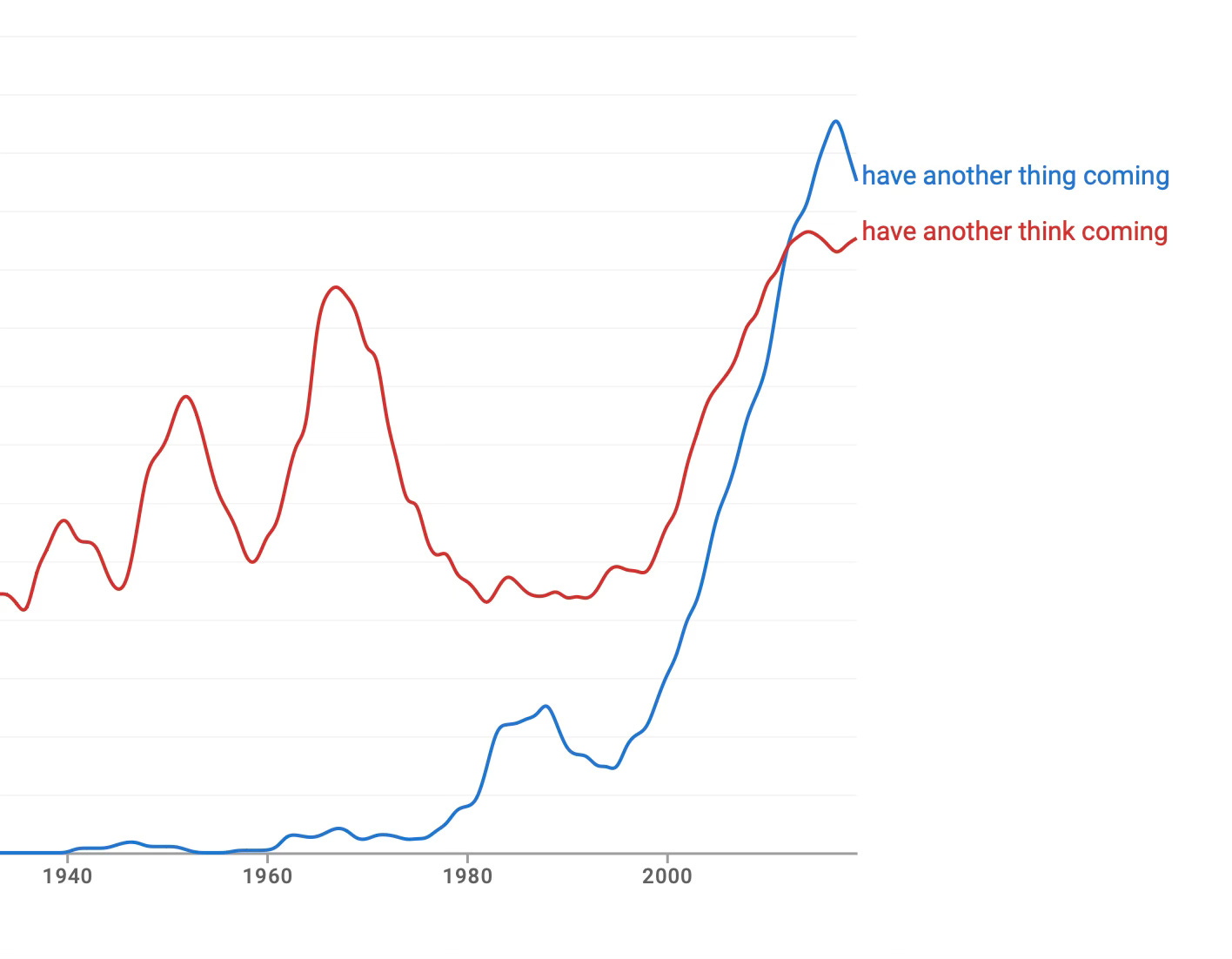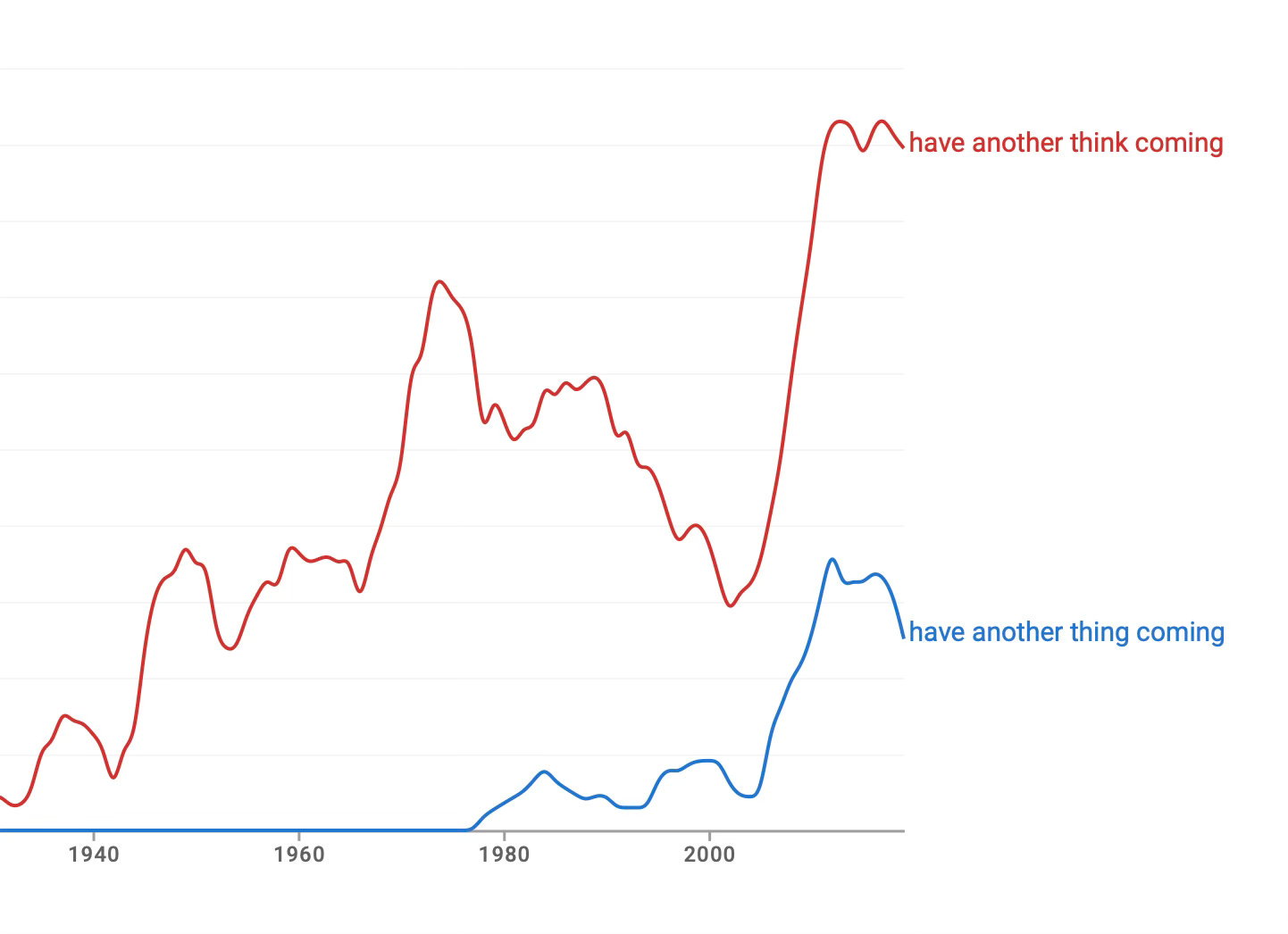Of course, people do go both ways.
[a think on things]
[originally published June 8, 2024]
An easy way to start an online brawl, I’ve found, is to open a debate on the difference between “nauseated” and “nauseous,”1 or to even mention2 the word “decimate.”3 Slightly less prone to truculence, I’ve found, is the question of whether one has (and I present these in alphabetical order, so that I won’t be seen to be taking sides prematurely) another thing coming, or another think coming.
Unlike in the battle of nauseated/nauseous, or in the great war of decimation, for which combatants tend to arrive with a bountiful arsenal of assertions and opinions, many of them wildly incorrect or unsupported, the thing/think thing seems to inspire mostly amused bemusement, because people who say “have another thing coming” often have no idea that anyone on earth says “have another think coming,” and people who say “have another think coming” are shocked to learn that anyone would even think of saying otherwise.4
For illumination, one has to go back to the fuller version of the thought—the ur-version, if you will5—which is, more or less: “If that’s what you think, then you have another think coming.”
That may still bring some people up short, because some people, I’ve found, have a hard time perceiving, much less accepting, the word “think” as a noun.6 Nevertheless, that’s where the “think” thing comes from.
And yet.
The “thing” version has been knocking around for a long time and is notably popular in the United States, as you can see in this handy-dandy Google Ngram chart.7
Whereas our cousins over on the other side of the big water favor the “think” version, and by a lot.
I would at this point caution any of my cousins over on the other side of the big water against condescending to us barbarous colonials, as you are wont to do, and you bloody well know it, because at least we don’t refer to spaghetti bolognese as “spag bol,” and Lord knows no one over here would ever conceive of calling a beloved monarch’s platinum jubilee her “platty joobs.”8
The “think” people may well assert that the “thing” version doesn’t make much sense, and I might have to concede that they’re correct, but not making much sense has never stopped words and phrases from barging their way into the English language9—plus, I think, the “thing” version conjures up an effective image of some extremely large, lumbering, and spiky, well, thing looming up over the horizon and heading in one’s direction with malevolent designs on one’s person.10
I can now, having laid all this out, admit that I was well into my thirties if not beyond before I ever encountered the “think” version, and though now I will tend to use it because I find that it makes a nice bracing noise,11 I don’t much care one way or the other.
I could care less, I might say.
And will.
And do.
To be continued.
Cover image: James Arness and Billy Curtis in a publicity still for The Thing from Another World (1951)
For the first twenty years or so of my life, when I was on the brink of hurling I was most certainly nauseous. Only eventually did I learn that, traditionally, things that cause nausea are nauseous and that if one is on the threshold of a Technicolor yawn,* one is nauseated. Though some people do get extremely exercised about this, I’m happy to align myself with our friends at Merriam-Webster, who note that “nauseous” in the sense of extremely queasy and likely preparing to do something about it has been a thing since the nineteenth century, which I think puts us well on the far side of the statute of limitations here. The M-W folk note as well that “nauseous” in the sense of “causing nausea” has largely given way to “nauseating.” Once again I urge you to recognize that absent a clear lack of clarity (I see none here), one would do well to pick a better fight. Let sleeping gauntlets lie, and all that.
* I have learned only now, postpublication of this little party piece, that the term “Technicolor yawn” may have been coined by, and seems undoubtedly to have been popularized by, my beloved Barry “Dame Edna Everage” Humphries. I also note that I have just footnoted a footnote. It was bound to happen sooner or later; I’m perhaps only surprised it took this long.
Yes, we split infinitives here. Moving on…
Good luck to those who would use “decimate” to mean only “to kill one in ten misbehaving Roman soldiers” while the rest of us are having a much jollier time using it to mean “to devastate,” plus we get to use it a lot more often. I would only request of those of us on Team To Devastate not to attach a percentage, proportion, or any other sort of figure to decimation, lest one write something extremely eye- or brain-popping like “the crops were decimated by one third.”
Apprised, I should note, they do tend to think that the people who say “have another thing coming” are morons.
I love “ur,” which is a kind of scholarly wackadoodle way to say primitive, or original. One often sees it capitalized, which may have something to do with its origin in German, because you know how those people like to capitalize things, but as someone who would lowercase weltschmerz and weltanschauung, to say nothing of schnitzelbank, because though they may derive from German and certainly look German, I happen to be speaking English, I would also lowercase “ur.” Also, if you cap it, people may think that you’re alluding, biblically, to Ur of the Chaldees, which you most certainly are not.
I often say that I’m going to have a think about something, don’t you?
Oh right, I have to mention it, because if I don’t a thousand people will: There’s a Judas Priest song called “You’ve Got Another Thing Comin’.” It will not perhaps surprise you to know that I don’t much know from Judas Priest songs.
I’d occasionally heard that the joobs thing was never more than a mere joke, a bit of cheeky self-mockery and deflation, eh wot. At least one of my British correspondents assures me that it was never any such thing.
My usual response to an aggrieved “It doesn’t make any sense!” is to merrily exclaim “Idiom!” and then run away as fast as my feet will carry me.
Or maybe I’m thinking of Godzilla.
A friend suggested that the very bracingness of the sound of “think coming” is one of the reasons it gave way to “thing coming.” That is, the collision of those two k noises is hard to hear and harder to pronounce. I think that my friend has a good point, which is also a good explanation, so long as we’re here, for how “iced tea” is increasingly giving way to “ice tea.” It’s that tricky double d, you’ll pardon the expression.





Definitely a "thing coming" person here who also definitely encountered "think coming" people only recently. [insert GIF of star-belly sneetches here]
I suspect, if I had to forensically reconstruct my path to this lifestyle, it is the challenge of the K-C collision combined with hearing it without the context of "if that's what you think." I always understood it as more of a threat: you won't get away with it, Buster, because unpleasant consequences await if you pursue the course of action you are contemplating.
(Judas Priest, about whom I know very little outside of the fact that their lead singer has a "Personal Life" link on his Wikipedia page, uses "thing coming" in the vague threat sense but in the context of thinking: "If you think I'll let it go, you're mad/You've got another thing comin.'" So they're no help at all.)
Since I'm rambling anyway, I want to say that I *love* the footnotes almost as much as the main text. They're like the after-party of your posts.
"Have a think" reminds me of Freddie inviting George to "come and have a bathe," so of course I like it.
As for the Jubilee, at the time the regrettable slang for it reminded me of my all-time favorite Aussie-ism, as related by dear Dame Edna: ladies referring to having undergone a delicate operation as having had their "hizzie at the hozzie."